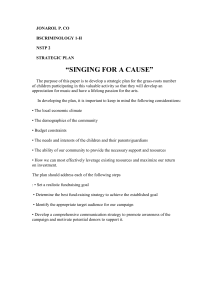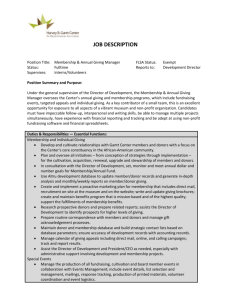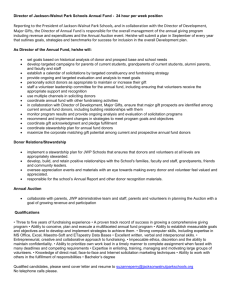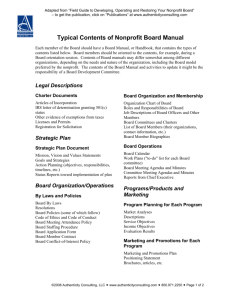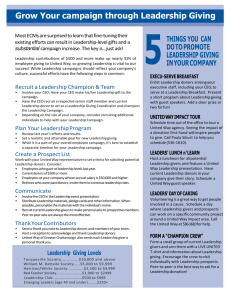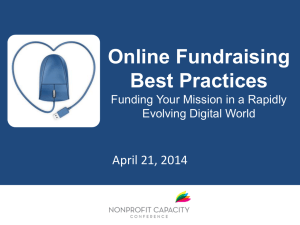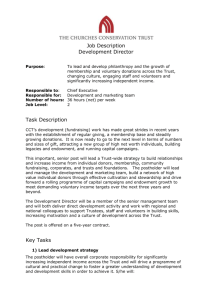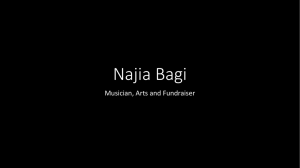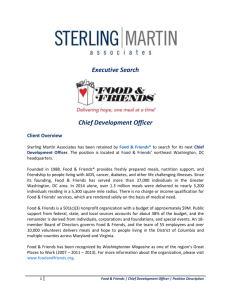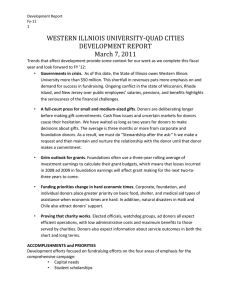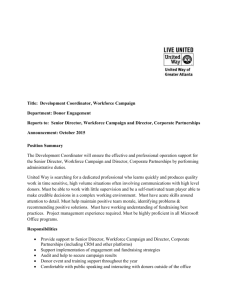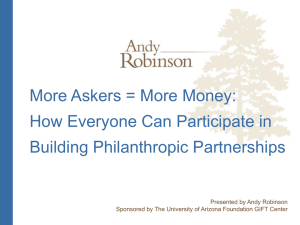Crafting the Case Statement - April 2010
advertisement
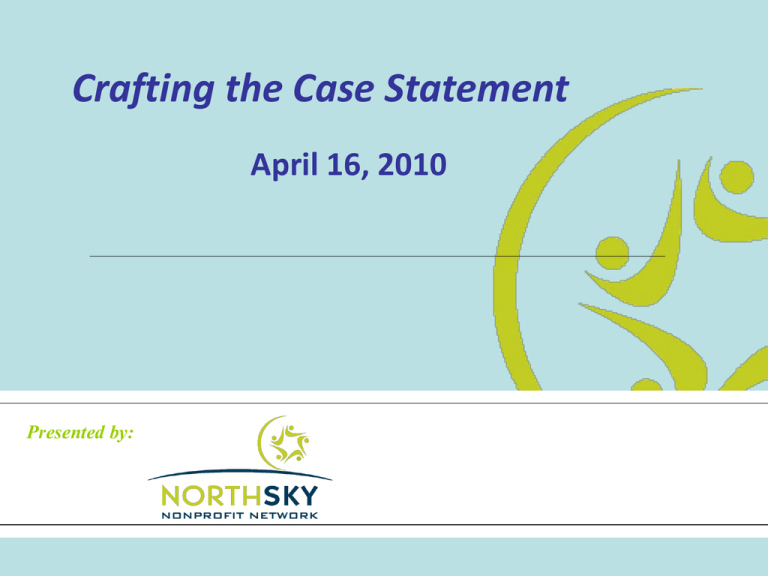
Crafting the Case Statement April 16, 2010 Presented by: Workshop Agenda 9:00 a.m. Welcome & Introductions Quick refresher- our last session Understand what is meant by “Case Statement” Understand how a case statement is used Review some sample case statements 10:30 Break 10:45 11:15 Practice developing a case statement De-brief exercise 11:30 11:45 Developing story banks Review writing and edit tips Noon Lunch Quick Refresher • How do we address fundraising during challenging economic times? • Where does our funding come from? • What elements are essential for fundraising success? The Fundraising Pyramid Planned Gift Capital Campaign Major Gift Repeat Donor First-time Donor Universe of Donors Fundraising Success 1. A Compelling Case 2. Defined Needs 3. Realistic Goals 4. Identified Prospects 5. Volunteer Leadership 6. Public Relations/ Marketing 7. Time and Timing 8. Adequate Staff 9. Budget The Case Statement • The nonprofit’s business plan: all the reasons why someone should support you • More than just your organization– looks at the greater need • Becomes the basis for grant proposals and solicitation of donors • The benefits-oriented explanation of the fund raising campaign. • From this document, the campaign brochure, campaign prospectus, video, newsletters and other materials will be created. Elements of a • • • • • • • • The title Grabbing the reader The irrefutable case Your unique position Waving the flag Reinforcing the urgency Making it happen Closing summary Case Statement Anwer these questions What problem are we trying to address? What program are we offering to address the problem? Why is this important? Who is our market? What do we need from donors? What are the financial needs? Why are we uniquely qualified to solve the problem? Sample Case Statements http://www.capitalcampaigns.com/case_statements/case_ health_center.php http://www.capitalcampaigns.com/case_statements/case_ mcdonald_house.php http://www.mountosb.org/kwc/caseStatement08.pdf http://blackrockarts.org/about/case.html Tips for preparing the case statement Involve key staff, board members, donors, and volunteers. Have only one writer Longer isn’t necessarily better Use simple, brief, understandable language Be convincing and optimistic Present a positive image Base it on the organization’s strengths not needs Project the future, not the past Tell the story with pictures and charts, where possible Make the case from the prospect’s point of interest Demonstrate the capacity to solve problems that are important to donors. Show the organization’s needs and wants are a good investment. Someone is going to ask you • About community “voice” (buy-in, engagement, support) • About your collaborative partnerships • About your sustainability plan • Why addressing this need is so important And you need to be ready to ANSWER. Exercise 1 Select a recorder and a reporter for your group Select an organization for which you’ll develop the case statement Focus on the “The Challenge” portion of the case statement Outline “The Challenge” being addressed by this nonprofit; what urgent, irrefutable need is being handled? What stories, statistics will you try to collect to illustrate your case? Creating a Story Bank • • • • • The story of your nonprofit Quotes, testimonials, case studies, photos Illustrate your mission in action The people behind the statistics Provide the emotional hook for why your organization is needed Creating a Story Bank Find the ideas From staff, clients, volunteers, letters Craft the words Meet & interview, gain permission, photo File them Central repository where you can find them with contact info, dates, etc Share the stories- Media releases, brochures, letters, website Writing & Editing Tips Keep it simple; avoid jargon Avoid intimidating the reader with too verbiage Illustrate your story- give examples, describe the benefits Make it interesting; tell a story Use photos, graphs, bullet points to make your point Don’t forget branding Back compelling statements with facts Be complete without being exhaustive Ultimately You are offering “someone” the opportunity to advance your mission, support your cause, change the world… … is that message clear? By the end of reading a good case, a reader should understand why your organization exists, how it responds to real community needs, and why it should be sustained as an organization or allowed to grow. NorthSky Online Resource Center www.northskynonprofitnetwork.org Thank You Contact NorthSky at: 231.929.3934 www.northskynonprofitnetwork.org Presented by:
